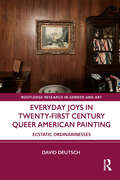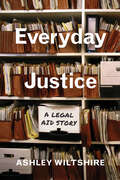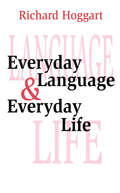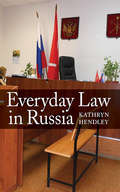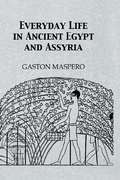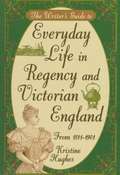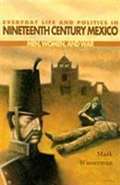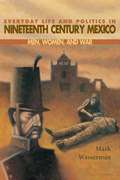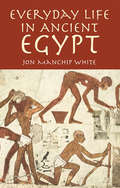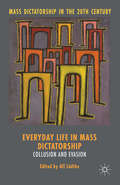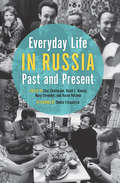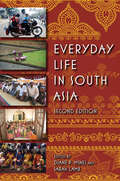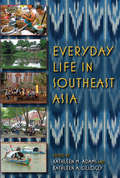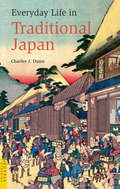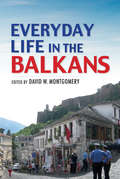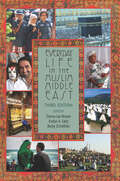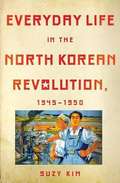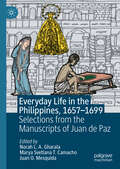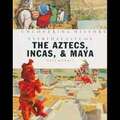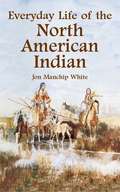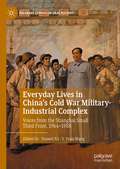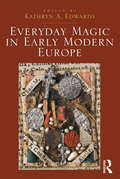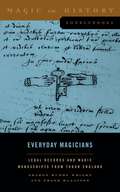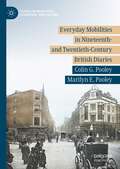- Table View
- List View
Everyday Joys in Twenty-First Century Queer American Painting: Ecstatic Ordinarinesses (Routledge Research in Gender and Art)
by David DeutschTaken together, the chapters in this book outline a theory and a practice of painting ecstatic ordinarinesses in contemporary, diverse American queer life. To do so, it offers the first sustained study of five individually renowned twenty-first-century queer painters—Gio Black Peter, Doron Langberg, Jonathan Lyndon Chase, Salman Toor, and João Gabriel—who have achieved substantial recognition from international museums, galleries, and critics working with short-form reviews but not yet from academics producing large-scale studies. This study argues for a broad understanding of what constitutes the queer American art of our time and for a broad sense of who can help to fashion American culture and history, including art by African American, Southeast Asian, Muslim and Jewish American, South American, and gender nonconforming queer artists. The book will be of interest to scholars working in art history, contemporary art, gender studies, and queer studies.
Everyday Justice: A Legal Aid Story
by Ashley WiltshireThe Legal Aid Society&’s mission is to advance, defend, and enforce the legal rights of low-income and otherwise vulnerable people in order to secure for them the basic necessities of life. Everyday Justice is an on-the-ground history of the Legal Aid Society of Middle Tennessee and the Cumberlands, the story of how national debates about access to justice have impacted the work of its lawyers, and a warning about why the federally imposed limits on that work must be lifted in order to fulfill the pledge of justice for all. Those surviving on low incomes often see the legal system as an oppressive force stacked against them. Everyday Justice is about lawyers trying to make the law work for these people. This book traces the development and evolution of legal aid in Middle Tennessee from the late 1960s to the turn of the millennium, as told by Ashley Wiltshire, who worked for the Legal Aid Society of Middle Tennessee and the Cumberlands in all its incarnations for four decades, beginning a year after its inception. Set in the context of the legal aid movement in the United States—beginning as a part of the social awakening in the post–Civil War era, continuing with volunteer efforts in the first part of the twentieth century, and coming to fruition beginning with the OEO Office of Legal Services grants of the 1960s as part of the War on Poverty—Everyday Justice is a story of Nashville, which levied an extended period of opposition because of prevailing cultural and religious views on race and poverty.
Everyday Language and Everyday Life
by Richard HoggartFor years Richard Hoggart has observed the oddity of a common speech habit: the fondness for employing ready-made sayings and phrasings whenever we open our mouths, a disinclination to form our own sentences "from scratch," unless that becomes inescapable. But in this book he is interested in more specific questions. How far do the British, and particularly the English, share the same sayings across the social classes? If each group uses some different ones, are those differences determined by location, age, occupation or place in the social scale? Over the years, did such sayings indicate some of the main lines of their culture, its basic conditions, its stresses and strains, its indications of meaning, and significance? These and other concerns animate this fascinating exploration of how the English, and particularly working-class English, use the English language.Hoggart sets the stage by explaining how he has approached his subject matter, his manner of inquiry, and the general characteristics of sayings and speech. Looking back into time, he explores the idioms and epigrams in the poverty setting of the early working-class English. Hoggart examines the very innards of working-class life and the idioms, with the language that arose in relation to home, with its main characters of wives and mothers, husbands and fathers, and children; the wars; marriage; food, drink, health, and weather; neighbors, gossip, quarrels, old age, and death. He discusses related idioms and epigrams and their evolution from prewar to present.Hoggart identifies the sayings and special nuances of the English working-class people that have made them identifiable as such, from the rude and obscene to the intellectual and imaginative. Hoggart also examines the areas of tolerance, local morality, and public morality, elaborating on current usage of words that have evolved from the fourteen through the eighteenth centuries. He touches on religion, superstition, and time, the beliefs that animate language. And finally, he focuses on aphorisms and social change and the emerging idioms of relativism, concluding that many early adages still in use seem to refuse to die.With inimitable verve and humor, Hoggart offers adages, apothegms, epigrams and the like in this colorful examination drawn from the national pool and the common culture. This volume will interest scholars and general readers interested in culture studies, communications, and education.
Everyday Law in Russia
by Kathryn HendleyEveryday Law in Russia challenges the prevailing common wisdom that Russians cannot rely on their law and that Russian courts are hopelessly politicized and corrupt. While acknowledging the persistence of verdicts dictated by the Kremlin in politically charged cases, Kathryn Hendley explores how ordinary Russian citizens experience law. Relying on her own extensive observational research in Russia's new justice-of-the-peace courts as well as her analysis of a series of focus groups, she documents Russians’ complicated attitudes regarding law. The same Russian citizen who might shy away from taking a dispute with a state agency or powerful individual to court might be willing to sue her insurance company if it refuses to compensate her for damages following an auto accident. Hendley finds that Russian judges pay close attention to the law in mundane disputes, which account for the vast majority of the cases brought to the Russian courts. Any reluctance on the part of ordinary Russian citizens to use the courts is driven primarily by their fear of the time and cost—measured in both financial and emotional terms—of the judicial process. Like their American counterparts, Russians grow more willing to pursue disputes as the social distance between them and their opponents increases; Russians are loath to sue friends and neighbors, but are less reluctant when it comes to strangers or acquaintances. Hendley concludes that the "rule of law" rubric is ill suited to Russia and other authoritarian polities where law matters most—but not all—of the time.
Everyday Life In Ancient Egypt
by MasparoPublished in the year 2005, Everyday Life In Ancient Egypt is a valuable contribution to the field of Ancient Egyptian History.
Everyday Life In Regency And Victorian England (The Writer's Guide To Everyday Life Ser.writer's Guide To Everyday Life Series)
by Kristine HughesIn this timesaving reference book, respected author and historian Kristine Hughes brings 19th century England to life as she leads you through the details that characterize this fascinating era. From slice-of-life facts, anecdotes and firsthand accounts, to sweeping timelines and major historical events, this guide presents the delightful and often surprising daily realities of Regency and Victorian England. With it, you'll craft a vibrant story as you learn what people ate, from pigeon pie and turtle dinners to syllabub and milk punch, where a prisoner would go if he were remanded to the "hulks; " the four coats a gentleman must have in his wardrobe, and other fashion requirements of the era; the rules honored by decent society, from the proper way to promenade to the polite hours to "call; " how couples married and divorced, through churching, wife-selling and other practices; what people did for work, from cottagers and climbing boys to milkmaids and manservants; the meaning of common slang words like mawleys and moleskins; what Cook's Tours were life and where they could take the adventurous; and trends in entertainment, such as dandies, panoramas and more.
Everyday Life and Politics in Nineteenth Century Mexico: Men, Women, and War
by Mark WassermanIn this new and masterful synthesis, Wasserman shows the link between ordinary men and women preoccupied with the demands of feeding, clothing, and providing shelter and the elites desire for a stable political order and an expanding economy. The emphasis in this book is on the struggle of the common people to retain control over their everyday lives. Concerns central to village life were the appointment of police officials, imposition of taxes on Indians, the trustworthiness of local priests, and changes in land ownership. Communities often followed their leaders into one political camp or another and even into war out of loyalty. During wartime, women acted as the supply, transportation, and medical corps of the Mexican armies. Moreover, with greater frequency than has been known, women fought as soldiers in the nineteenth century.
Everyday Life and Politics in Nineteenth Century Mexico: Men, Women, and War (Diálogos Series)
by Mark WassermanIn this new and masterful synthesis, Wasserman shows the link between ordinary men and women-preoccupied with the demands of feeding, clothing, and providing shelter-and the elites' desire for a stable political order and an expanding economy. The three key figures of nineteenth-century Mexico-Antonio López de Santa Ana, Benito Juárez, and Porfirio Díaz-are engagingly reinterpreted. But the emphasis in this book is on the struggle of the common people to retain control over their everyday lives. Concerns central to village life were the appointment of police officials, imposition of taxes on Indians, the trustworthiness of local priests, and changes inland ownership. Communities often followed their leaders into one political camp or another-and even into war-out of loyalty. Excesses in partisan politics and regional antagonisms gave rise to nearly eighty years of war, resulting in the nation's economic stagnation between 1821 and 1880 and the mass migration of women from the countryside to the city. The industrialization of urban employment forever altered gender relations. During wartime, women acted as the supply, transportation, and medical corps of the Mexican armies. Moreover, with greater frequency than has been known, women fought as soldiers in the nineteenth century. This account of Mexico from Independence to the Revolution combines lively explanations of social history, political and economic change, and gender relations. Wasserman offers a well-written, thoughtful, and original history of Mexico's nineteenth century that will appeal to students and specialists alike.At long last, a clear-headed, non-romanticized, and non-adversarial analysis of everyday life and politics across the vast sweep of a century of change and rebirth. This is a first-rate book, expert and highly accessible.--Professor Timothy E. Anna, University of Manitoba
Everyday Life in Ancient Egypt
by Jon Manchip WhiteDrawing on a wealth of archeological evidence, author Jon Manchip White presents a remarkably accurate picture of Egyptian life throughout dynastic times -- from the end of the third millennium to the Greek occupation in 330 BC. Because social conditions changed little during these 3,000 years, readers get a clear idea of the roles and tasks assigned to each section of the community -- to the Pharaoh and his noblemen; priests and soldiers; scribes and artists; and peasants, who formed the bulk of the population. How these people spent their leisure hours, how they dressed, what they ate and drank, forms of transportation used, how homes were built and furnished, and the activities of women and children are also thoroughly examined. Special emphasis is placed on the importance of religion in daily life, including the social significance of temples, pyramids, and tombs. Accompanying a vivid text are more than 100 photographs and line drawings. "A handy reference tool." -- Horn Book.
Everyday Life in Mass Dictatorship: Collusion and Evasion (Mass Dictatorship in the Twentieth Century)
by Alf L�dtkeOppression and violence are often cited as the pivotal aspects of modern dictatorships, but it is the collusion of large majorities that enable these regimes to function. The desire for a better life and a powerful national, if not imperial community provide the basis for the many forms of people's cooperation explored in this volume.
Everyday Life in Russia: Past and Present (Indiana-michigan Series In Russian And East European Studies)
by Sheila FitzpatrickA panoramic, interdisciplinary survey of Russian lives and &“a must-read for any scholar engaging with Russian culture&” (The Russian Review). In this interdisciplinary collection of essays, distinguished scholars survey the cultural practices, power relations, and behaviors that characterized Russian daily life from pre-revolutionary times through the post-Soviet present. Microanalyses and transnational perspectives shed new light on the formation and elaboration of gender, ethnicity, class, nationalism, and subjectivity. Changes in consumption and communication patterns, the restructuring of familial and social relations, systems of cultural meanings, and evolving practices in the home, at the workplace, and at sites of leisure are among the topics explored. &“Offers readers a richly theoretical and empirical consideration of the &‘state of play&’ of everyday life as it applies to the interdisciplinary study of Russia.&” —Slavic Review &“An engaging look at a vibrant area of research . . . Highly recommended.&” —Choice &“Volumes of such diversity frequently miss the mark, but this one represents a welcomed introduction to and a &‘must&’ read for anyone seriously interested in the subject.&” —Cahiers du Monde russe
Everyday Life in South Asia, Second Edition
by Sarah E. Lamb Diane P. MinesThis anthology provides a lively and stimulating view of the lives of ordinary citizens in India, Pakistan, Bangladesh, Nepal, and Sri Lanka. For the second edition of this popular textbook, readings have been updated and new essays added. The result is a timely collection that explores key themes in understanding the region, including gender, caste, class, religion, globalization, economic liberalization, nationalism, and emerging modernities. New readings focus attention on the experiences of the middle classes, migrant workers, and IT professionals, and on media, consumerism, and youth culture. Clear and engaged writing makes this text particularly valuable for general and student readers, while the range of new and classic scholarship provides a useful resource for specialists.
Everyday Life in Southeast Asia
by Kathleen A. Gillogly Kathleen M. AdamsThis lively survey of the peoples, cultures, and societies of Southeast Asia introduces a region of tremendous geographic, linguistic, historical, and religious diversity. Encompassing both mainland and island countries, these engaging essays describe personhood and identity, family and household organization, nation-states, religion, popular culture and the arts, the legacies of war and recovery, globalization, and the environment. Throughout, the focus is on the daily lives and experiences of ordinary people. Most of the essays are original to this volume, while a few are widely taught classics. All were chosen for their timeliness and interest, and are ideally suited for the classroom.
Everyday Life in Traditional Japan
by Laurence Broderick Charles J. DunnEveryday Life in Traditional Japan paints a vivid portrait of Tokugawa Japan, a time when contact with the outside world was deliberately avoided and the daily life of the different classes consolidated the traditions that shaped modern Japan.With detailed descriptions and over 100 illustrations, authentic samurai, farmers, craftsmen, merchants, courtiers, priests, entertainers and outcasts come to life in this magnificently illustrated portrait of a colorful society. Most works of Japanese history fail to provide enough details about the lives of the people who lived during the time. The level of detail in Everyday Life in Traditional Japan allows for a more complete picture of the history of Japan.In fascinating detail, Charles J. Dunn, describes how each class lived: their food, clothing, and houses; their their beliefs and their fears. At the same time he takes account of certain important groups that fell outside the formal class structure, such as the courtiers in the emperor's palace at Kyoto, the Shinto and Buddhist priests, and the other extreme, the actors and the outcasts. he concludes with a lively account of everyday life in the capital city of Edo, the present-day Tokyo.
Everyday Life in the Balkans
by David W. MontgomeryEveryday Life in the Balkans gathers the work of leading scholars across disciplines to provide a broad overview of the countries of Albania, Bosnia and Herzegovina, Bulgaria, Croatia, Greece, Kosovo, Macedonia, Romania, Serbia, and Turkey. This region has long been characterized as a place of instability and political turmoil, from World War I, through the Yugoslav Wars, and even today as debate continues over issues such as the influx of refugees or the expansion of the European Union. However, the work gathered here moves beyond the images of war and post-socialist stagnation which dominate Western media coverage of the region to instead focus on the lived experiences of the people in these countries. Contributors consider a wide range of issues including family dynamics, gay rights, war memory, religion, cinema, fashion, and politics. Using clear language and engaging examples, Everyday Life in the Balkans provides the background context necessary for an enlightened conversation about the policies, economics, and culture of the region.
Everyday Life in the Muslim Middle East, Third Edition
by Lila Abu-Lughod Dawn Chatty Marcia C. Inhorn Farha Ghannam Jonathan Holt Shannon Sherine Hamdy Jenny White Susan Slyomovics Melani Cammett Ziba Mir-Hosseini Fida J. Adely Kristin V. Monroe Brian Silverstein Walter Armbrust Samer S. Shehata Andrew Gardner Diane Singerman William O. Beeman Quintan Wiktorowicz Robert R. Bianchi Victoria Fontan Christine El Ouardani Momina Zakzouk Anne H. Betteridge Steven Caton Angel Foster Simon Hawkins Natalie K. Jensen Kristina Nelson Yagmur Nuhrat Marcie Patton Erika Friedl Loeffler Brian K. BarberThe substantially revised and updated third edition of Everyday Life in the Muslim Middle East focuses on the experiences of ordinary men, women, and children from the region. Readers will gain a grassroots appreciation of Middle East life, culture, and society that recognizes the impact of wars and uprisings as well as changes to Islamic practice due to advances in technology. The book also explores the influence of social media on politics and labor relations and the changing status of women, family values, marriage, childrearing, gender, and gay rights. This dynamic and imaginative volume continues to provide a rich resource for understanding contemporary Muslim culture in the Middle East.
Everyday Life in the North Korean Revolution, 1945–1950
by Suzy KimDuring the founding of North Korea, competing visions of an ideal modern state proliferated. Independence and democracy were touted by all, but plans for the future of North Korea differed in their ideas about how everyday life should be organized. Daily life came under scrutiny as the primary arena for social change in public and private life. In Everyday Life in the North Korean Revolution, 1945-1950, Kim examines the revolutionary events that shaped people's lives in the development of the Democratic People's Republic of Korea. By shifting the historical focus from the state and the Great Leader to how villagers experienced social revolution, Kim offers new insights into why North Korea insists on setting its own course.Kim's innovative use of documents seized by U.S. military forces during the Korean War and now stored in the National Archives--personnel files, autobiographies, minutes of organizational meetings, educational materials, women's magazines, and court documents--together with oral histories allows her to present the first social history of North Korea during its formative years. In an account that makes clear the leading role of women in these efforts, Kim examines how villagers experienced, understood, and later remembered such events as the first land reform and modern elections in Korea's history, as well as practices in literacy schools, communal halls, mass organizations, and study sessions that transformed daily routine.
Everyday Life in the Philippines, 1657–1699: Selections from the Manuscripts of Juan de Paz
by Norah L. A. Gharala Marya Svetlana T. Camacho Juan O. MesquidaThis book examines the legacy of one of the most influential members of Spanish society in the seventeenth-century Philippines, Dominican scholar Juan de Paz. Using a unique manuscript from the collections of the Archivo de la Universidad de Santo Tomás in Manila, the authors provide a window into the concerns, problems, and entanglements of people of different ethnicities, occupations, and stations in life. Paz’s writings resolving conflicts and weighing in on questions (consultas) have not previously been translated into English. The transcriptions, translations, and editorial introductions collected in this volume therefore make it an invaluable resource for students and scholars interested in the cultural and social history of the Philippines and the Spanish empire.
Everyday Life of the Aztecs, Incas, and Maya
by Neil MorrisThis exciting new series peels back the years to uncover a wealth of information about ancient civilizations from around the world. Touching upon fashion, warfare, architecture, government, and much more, "Uncovering History breathes life into the past. Transparent overlays add to the fun, letting readers make their own discoveries.
Everyday Life of the North American Indian (Native American)
by Jon Manchip WhiteThis book by the author of several outstanding studies of ancient peoples vividly recounts the story of the Native Americans -- from their earliest beginnings as immigrants from the Asian mainland, to their lives as tragic figures on U. S. government-authorized reservations.A story of great depth and perspective, Everyday Life of the North American Indian traces the subjects' various roles in the New World: as nomad, hunter, and farmer; as athlete, warrior, parent, and spouse; as witch doctor, worshipper, artist, and craftsman.Enhanced with more than 100 illustrations, this comprehensive, highly readable book will be valued by students of American history and welcomed by all those intrigued by Native American culture.
Everyday Lives in China's Cold War Military-Industrial Complex: Voices from the Shanghai Small Third Front, 1964-1988 (Palgrave Studies in Oral History)
by Y. Yvon Wang Youwei XuThis book translates and contextualizes the recollections of men and women who built, lived, and worked in some of the factory compounds relocated from China’s most cosmopolitan city—Shanghai. Small Third Line factories became oases of relatively prosperous urban life among more impoverished agricultural communities. These accounts, plus the guiding questions, contextual notes, and further readings accompanying them, show how everyday lives fit into the sweeping geopolitical changes in China and the world during the Cold War era. Furthermore, they reveal how the Chinese Communist Party’s military-industrial strategies have shaped China’s economy and society in the post-Mao era. The approachable translations and insight into areas of life rarely covered by political or diplomatic histories like sexuality and popular culture make this book highly accessible for classroom use and the general-interest reader.
Everyday Magic in Early Modern Europe
by Kathryn A. EdwardsWhile pre-modern Europe is often seen as having an 'enchanted' or 'magical' worldview, the full implications of such labels remain inconsistently explored. Witchcraft, demonology, and debates over pious practices have provided the main avenues for treating those themes, but integrating them with other activities and ideas seen as forming an enchanted Europe has proven to be a much more difficult task. This collection offers one method of demystifying this world of everyday magic. Integrating case studies and more theoretical responses to the magical and preternatural, the authors here demonstrate that what we think of as extraordinary was often accepted as legitimate, if unusual, occurrences or practices. In their treatment of and attitudes towards spirit-assisted treasure-hunting, magical recipes, trials for sanctity, and visits by guardian angels, early modern Europeans showed more acceptance of and comfort with the extraordinary than modern scholars frequently acknowledge. Even witchcraft could be more pervasive and less threatening than many modern interpretations suggest. Magic was both mundane and mysterious in early modern Europe, and the witches who practiced it could in many ways be quite ordinary members of their communities. The vivid cases described in this volume should make the reader question how to distinguish the ordinary and extraordinary and the extent to which those terms need to be redefined for an early modern context. They should also make more immediate a world in which magic was an everyday occurrence.
Everyday Magicians: Legal Records and Magic Manuscripts from Tudor England (Magic in History Sourcebooks)
by Frank Klaassen Sharon Hubbs WrightMost of the women and men who practiced magic in Tudor England were not hanged or burned as witches, despite being active members of their communities. These everyday magicians responded to common human problems such as the vagaries of money, love, property, and influence, and they were essential to the smooth functioning of English society. This illuminating book tells their stories through the legal texts in which they are named and the magic books that record their practices.In legal terms, their magic fell into the category of sin or petty crime, the sort that appeared in the lower courts and most often in church courts. Despite their relatively lowly status, scripts for the sorts of magic they practiced were recorded in contemporary manuscripts. Juxtaposing and contextualizing the legal and magic manuscript records creates an unusually rich field to explore the social aspects of magic practice. Expertly constructed for both classroom use and independent study, this book presents in modern English the legal documents and magic texts relevant to ordinary forms of magic practiced in Tudor England. These are accompanied by scholarly introductions with original perspectives on the subjects. Topics covered include: the London cunning man Robert Allen; magic to identify thieves; love magic; magic for hunting, fishing and gambling, and magic for healing and protection.
Everyday Mobilities in Nineteenth- and Twentieth-Century British Diaries (Studies in Mobilities, Literature, and Culture)
by Colin G. Pooley Marilyn E. PooleyThis book uses diaries written by ordinary British people over the past two centuries to examine and explain the nature and extent of everyday mobilities, such as travel to school, to work, to shop or to visit friends, and to explore the meanings attached to these mobilities. After a critical evaluation of diary writing, the ways in which mobility changed over time, interacted with new forms of transport technology, and varied from place to place are examined. Further chapters focus on the roles of family and life course, gender, income and class, and journey purpose in shaping mobilities, including immobility. It is argued that easy and frequent everyday mobilities were experienced by most of the diarists studied, that travellers could exercise their own agency to adapt easily to new forms of transport technology, but that factors such as gender, class, and location also created significant mobility inequalities.
